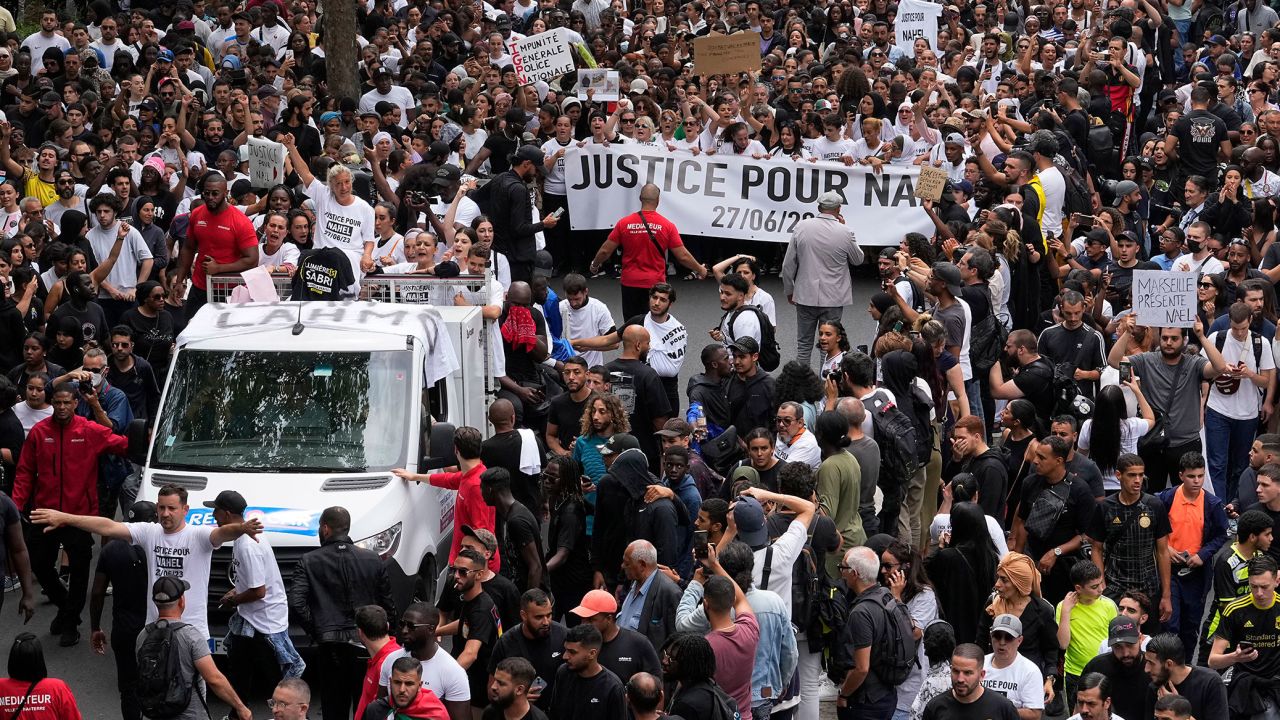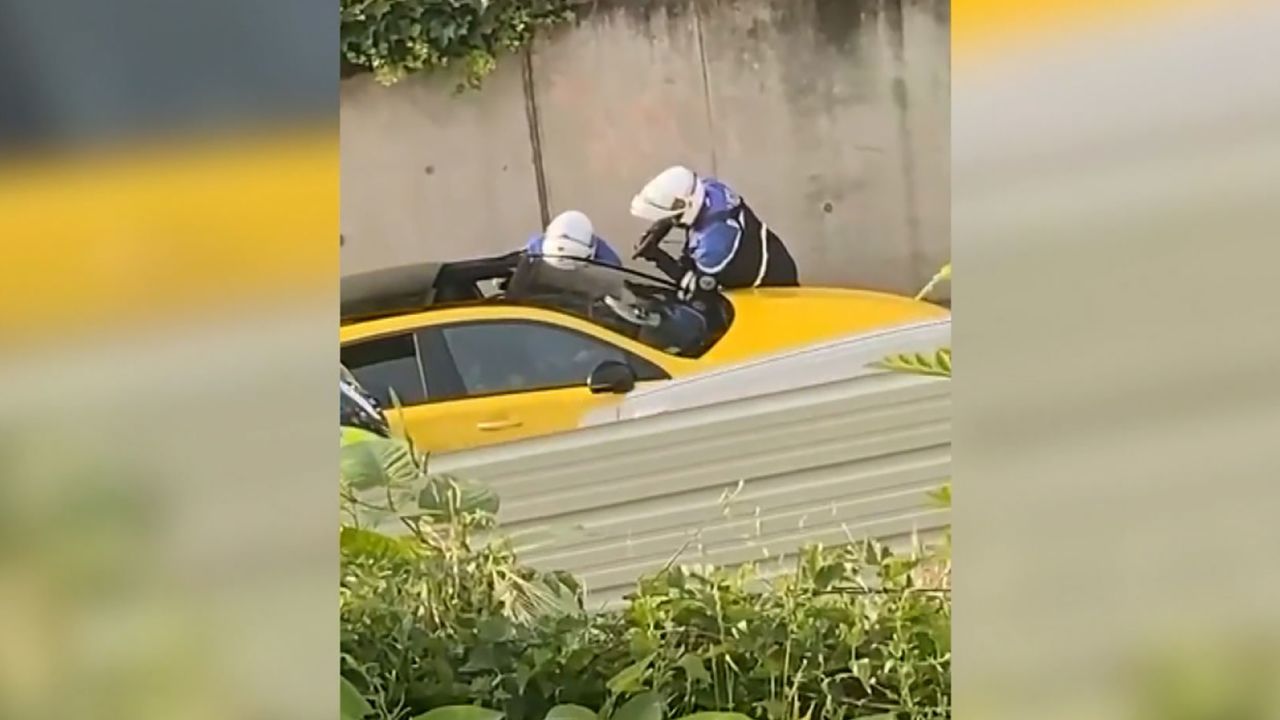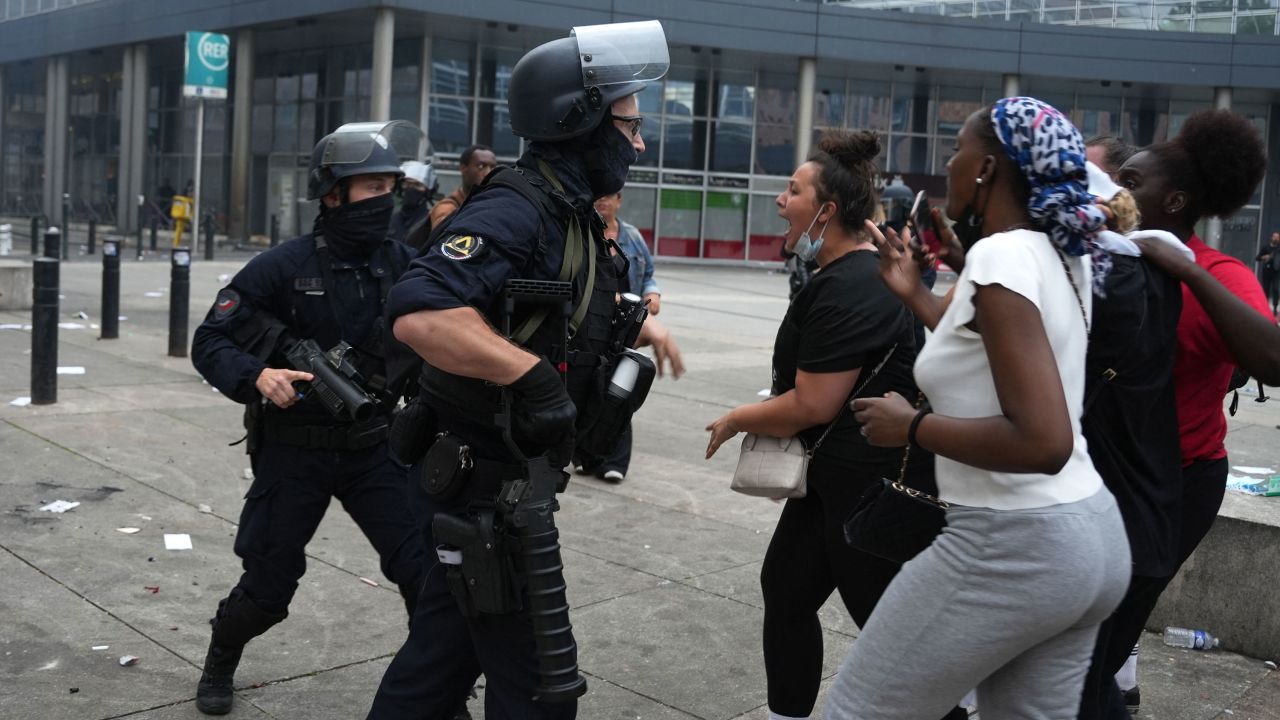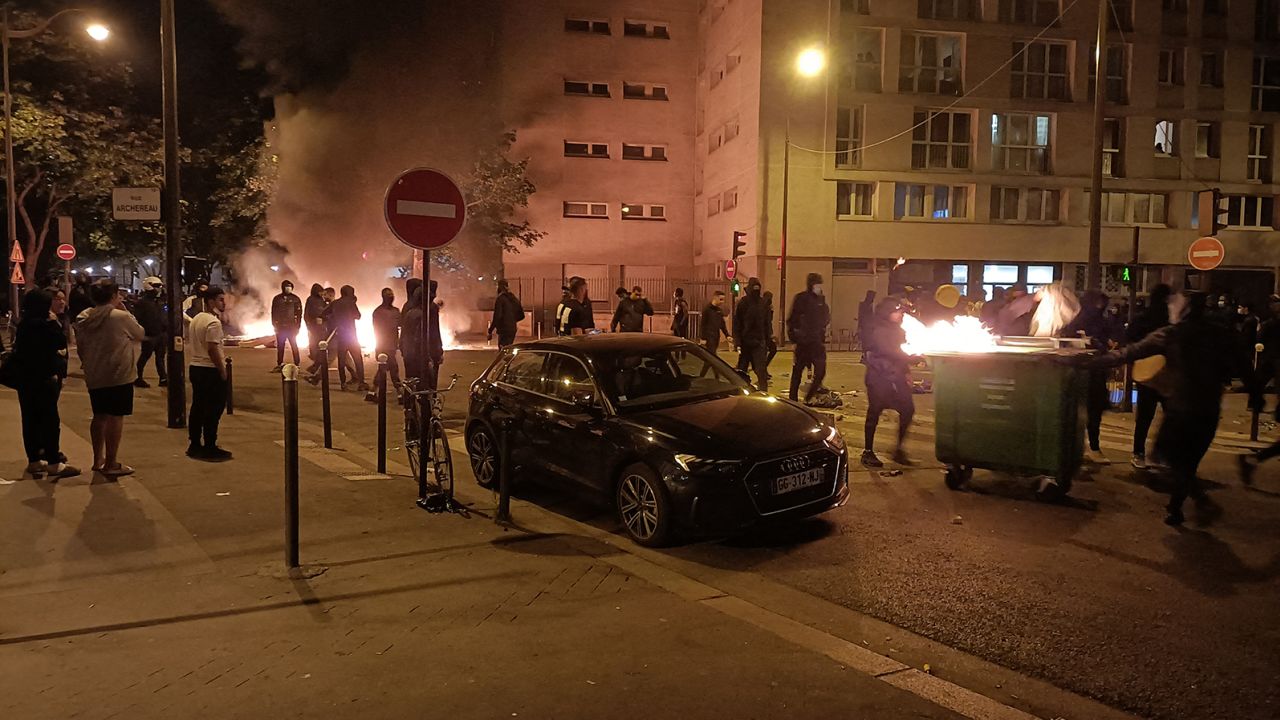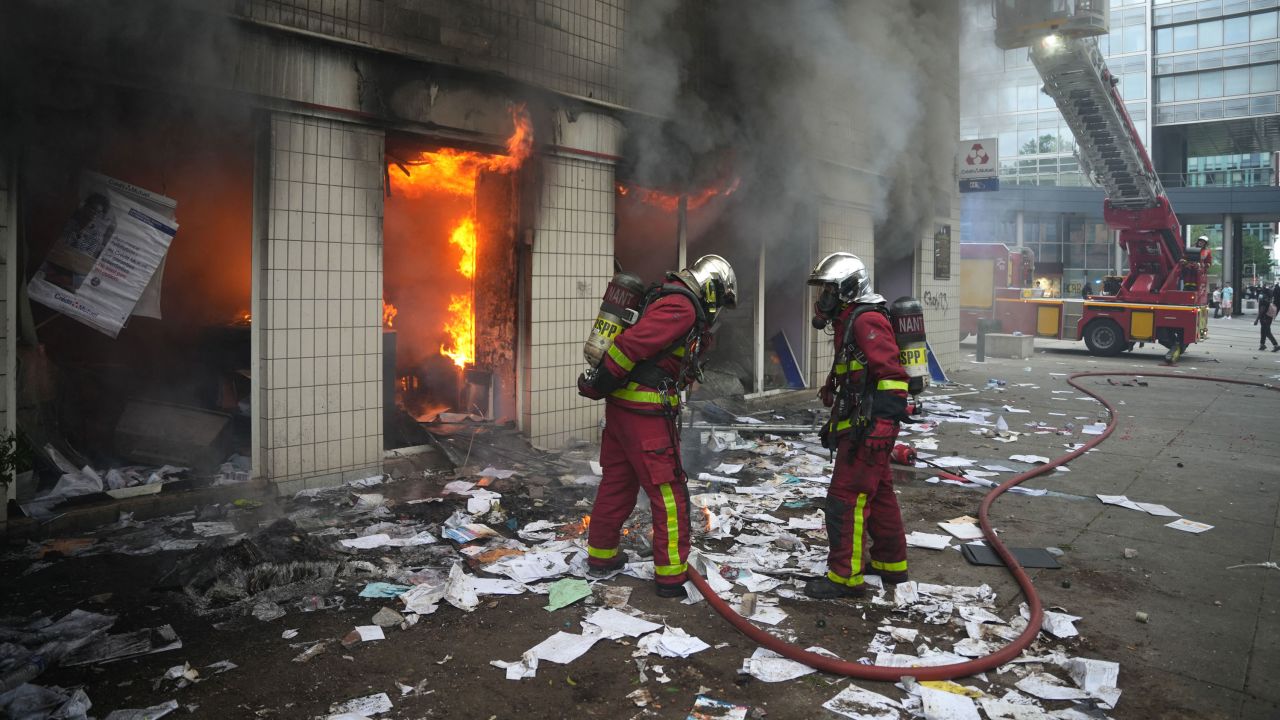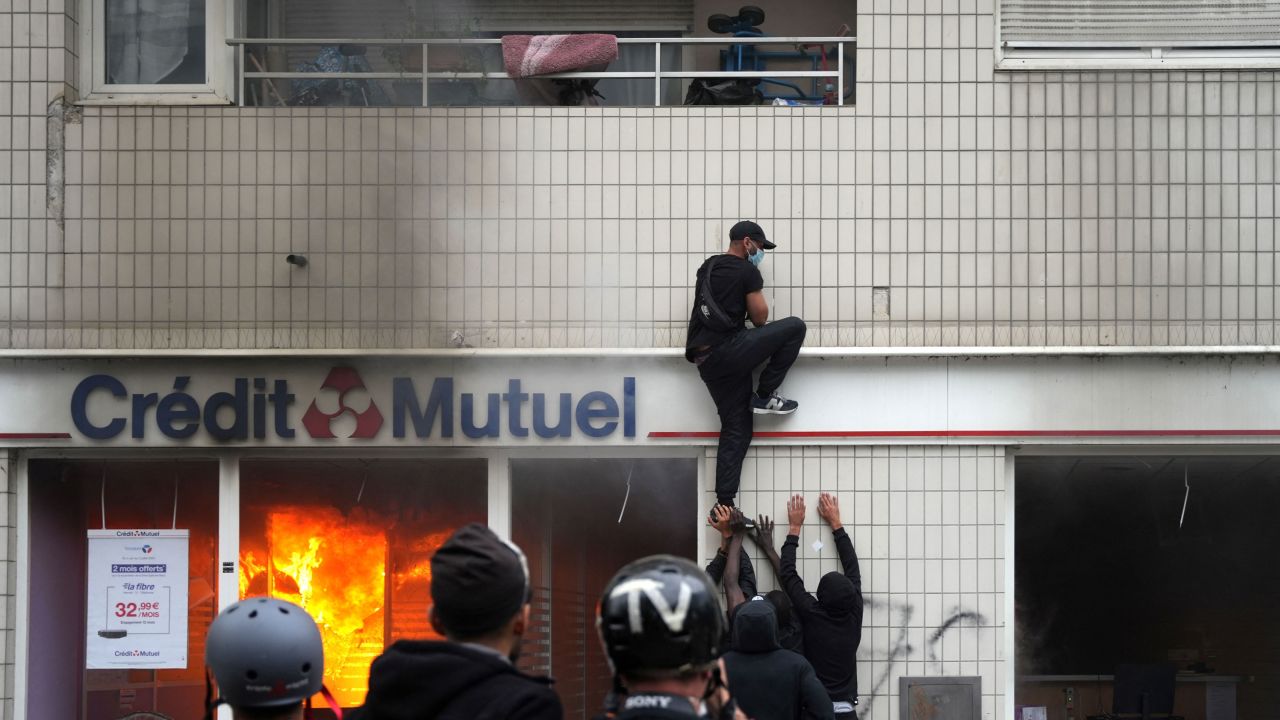ParisCNN —
More than 400 people were arrested across France on Thursday as a wave of protests swept the country for a third night following the fatal police shooting of a teenage boy that was captured on video.
France’s elite police force, the RAID, were deployed to the cities of Bordeaux, Lyon, Roubaix, Marseille and Lille, to help contain the protests.
Confrontations flared up between protesters and police in the Parisian suburb of Nanterre – where the 17-year-old named Nahel was killed days before – and in the southern port city of Marseille.
Amid burning debris, “vengeance pour Nael” appeared to be spray painted on a wall in Nanterre, which translates to “revenge for Nael” in reference to the slain teenager and using an alternative spelling of his name, according to footage from the suburb.
A bank was set on fire in Nanterre, according to photographs from the scene, and 15 people have been taken in for questioning by police after a march held in memory of the teenager turned violent.
Protesters threw fireworks at police officers in Marseille, according to CNN affiliate BFMTV, while footage from the northern city of Lille showed fires burning on streets and running riot police officers. Six people were taken in for questioning after participating in a protest banned by authorities in Lille, the regional authority said in a Facebook post.
At least 421 people were arrested in the protests across France from Thursday night into Friday morning, French Interior Minister Gerald Darmanin told BFMTV.
More than half of those arrests took place in the Paris region, in the departments of Hauts-de-Seine, Seine-Saint-Denis and Val-de-Marne, BFMTV reported, citing Paris police.
Earlier, Darmanin said police were instructed to “intervene systematically” and expressed support for the police officers and firefighters who “are doing a courageous job.”
President Emmanuel Macron will hold a crisis meeting Friday for the second day in a row following Thursday night’s violence, BFMTV reported.
Authorities had hoped to avoid a repeat of the scenes that played out Wednesday night, when police stations, town halls and schools were set alight in various cities and about 150 people were arrested. The Interior Ministry earlier said it planned on deploying 40,000 police officers across the country Thursday – including 5,000 in Paris – to quell any potential unrest.
The unrest broke out Tuesday, hours after a police traffic stop in Nanterre resulted in the killing of Nahel. Over the course of a chaotic night, 40 cars were burned and 24 police officers injured, French authorities claimed. The police officer was put under formal investigation for voluntary homicide and placed in preliminary detention, BFMTV reported Thursday.
On Thursday, an estimated 6,000 people, according to BFMTV, joined a march to honor Nahel led by his mother in Nanterre.
Many wore shirts emblazoned with “justice for Nahel,” while others shouted the slogan. Some were seen holding signs saying “the police kill.” A lawyer for the family on Thursday confirmed the spelling of the boy’s name as Nahel; he was initially identified as Naël.
Buses and tramways in Lille shut down after 8 p.m. local time, according to BFMTV, and a couple of Parisian suburbs have installed curfews.
Bus and tram services were also suspended in the Île-de-France region, which includes Paris, from Thursday night, the local transport authority said. Government ministers were asked to postpone non-urgent travel and remain in Paris due to the protests, a government source told CNN on Thursday, speaking on condition of anonymity citing French professional norms.
The violent scenes seen over the past two days have raised concerns that Nahel’s death could lead to a level of unrest and rioting not seen since 2005, when the deaths of two teenage boys hiding from police sparked three weeks of rioting and prompted the government to call a state of emergency.
The video of Nahel’s killing has sparked a similar level of shock and anger across France, touching a particular nerve among young men and women of color who feel that they have been discriminated against by police. A 2017 study by the Rights Defenders, an independent human rights watchdog in France, found that young men perceived to be Black or Arab were 20 times more likely to be stopped by police than their peers.
Many of these individuals are simply “tired,” journalist and racial equality activist Rokhaya Diallo told CNN.
“People know and have been speaking about police brutality and have not been heard,” she said.
The Algerian Foreign Ministry on Thursday extended its condolences to Nahel’s family, saying in a statement their “grief and sorrow are widely shared in our country” and that it will “closely follow the developments of this tragic case.”
The ministry said it trusts the French government to “carry out their duty to protect, assure peace of mind and security which Algerian nationals are entitled to in their host country.”
French media have reported that the teenager was of Algerian descent.
Video of the shooting in Nanterre surfaced on social media shortly after the incident took place Tuesday morning. The clip shows two police officers standing on the driver’s side of a yellow Mercedes AMG, one near the door and another near the left front fender. As the car attempts to drive away, one officer is seen firing his sidearm.
The bullet that hit Nahel pierced his arm and chest. After fleeing the scene, the car crashed into a stationary object at a nearby plaza. Nahel was in the car with two others at the time of the incident. One passenger in the vehicle was taken into custody and later released, while another, who is believed to have fled the scene, is missing, authorities said.
The local Nanterre prosecutor, Pascal Prache, said Thursday that the officers testified both drew their weapons and pointed them at the driver to dissuade him from restarting the engine. The officer who fired his weapon said, according to the prosecutor, that he was scared the boy would run someone over with the car. However, Prache said it is believed the officer accused of shooting and killing Nahel may have acted illegally in doing so.
Lawyers for Nahel’s family slammed the decision not to pursue charges over alleged false statements, claiming the officer said in his initial declaration that “young Nahel had tried to run him over with the vehicle.” CNN has asked the French national police for a response to the allegations against the unnamed officer.
Prache said that Nahel had been known to authorities for a previous “breach of rules,” but it is not clear what law or orders that pertains to. The teen was expected to appear before a juvenile court in September.
Laurent-Franck Lienard, the lawyer of the officer accused of shooting Nahel, told French radio station RTL that his client acted in “compliance of the law.”
In another interview with BFMTV, he said that any accusations his client lied in a statement were false as he had never made a written statement and that his verbal testimony did not contradict the facts.
He claimed his client’s prosecution was “political” and being used as a way to calm the violent tensions.
As to the deadly incident, Lienard said police officers had “struggled for 30 seconds” to detain the driver while the car had stopped. He added that his client feared for the safety of the public as the car had nearly hit pedestrians before the start of the video.
Lienard said his client was not the person in the video who shouted, “I’ll put a bullet in your head,” while also suggesting that might not have been what was said.
He added that his client was “devastated” by Nahel’s death and he did not want to kill him. “He committed an act in a second, in a fraction of a second. Perhaps he made a mistake, justice will tell,” Liénard said.
Macron and other government officials, including Prime Minister Elisabeth Borne, have called for patience to allow the criminal justice system to run its course.
“We need calm for justice to carry out its work,” Macron said Wednesday. “We can’t allow the situation to worsen.”
Rallying public support and goodwill, however, is likely to be difficult for Macron’s government given how much political capital it spent in the first half of 2023 pushing through unpopular pension reforms, which sparked months of mostly peaceful mass protests.
Acknowledging the government’s massive unpopularity, Macron gave himself 100 days to heal and unite the country. That deadline is up on July 14, France’s national day.
Addressing allegations of institutional racism in France is particularly challenging given the country’s unique brand of secularism, which seeks to ensure equality for all by removing markers of difference, rendering all citizens French first. In practice, however, the vigorous adherence to French Republicanism often prevents the government from doing anything that would appear to differentiate French citizens on the basis of race, including collecting statistics.
Racial and religious data, where available, typically comes from private institutions, and extra care is typically taken by politicians to avoid circumscribing racial motives to state institutions.
“On a general level, people tend to think there is no racism in France. And it’s one of the reasons people are so angry, because they feel and experience racism on a daily basis,” said Diallo, the anti-racism activist. “Despite that, they still face institutions, public discourse, and media which still say that there is no racism and that the race debate does not belong in France. And that’s the reason people are so angry and so outraged.”
Government officials have so far not broached questions of racism in the police. Leaders of opposition left-wing parties have focused their criticisms on police violence rather than racism. Government spokesman Olivier Veran told BFMTV that anger against the state itself, however, is unjustified.
“It is not the republic that killed this young man,” Veran said. “It is one man who must be judged if the justice system deems it necessary.”

.jpg)



